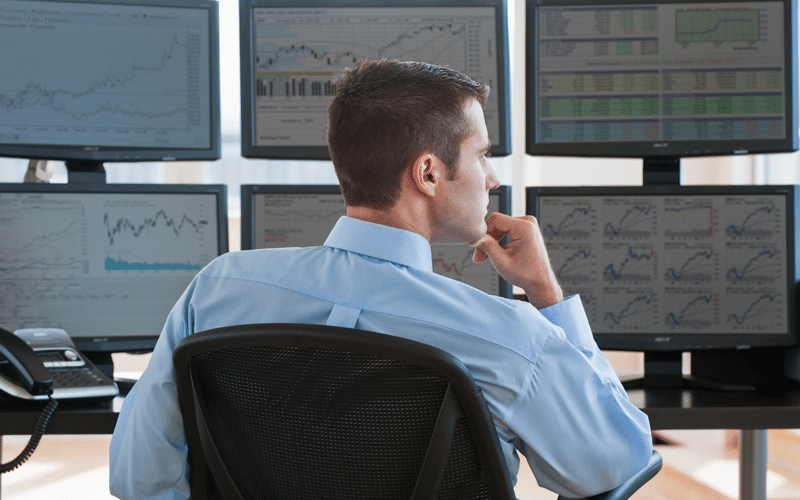Forex trading: Discretionary or Mechanical
Mechanical Trading strategy removes the need to predict by laying down some rules. The system informs the trader when to enter and exit the market and how much to risk so that they don’t have to make predictions.

The Discretionary Trading strategy focuses on the intuition, market knowledge, and gut feeling of the trader. This method is best suited for individuals with long term experience of successfully trading in the market. However, with the discretionary trading method, we open up to cognitive and psychological biases that may lead to bad decisions in the heat of the moment.
Mechanical and Discretionary trading differ from each other in the following ways:
- Mechanical Trading has a fixed set of rules that have been back-tested while Discretionary Trading is carried out based on the trader’s deep market knowledge and intuition.
- Mechanical Trading works on predefined rules, so changes in the market situation don’t affect the system’s buy and sell orders. In contrast, Discretionary Trading is adaptive to current market situations, so one can choose to either expedite or delay the trade.
- If the trader trusts the system, Mechanical Trading can reduce the fear associated with executing trades due to the priorly established rules in accordance with our preferences. On the other hand, the trader relies on his intuition and reasoning with Discretionary Trading, which can lead to fear and stress due to the market’s uncertainty and the risks involved.
Two Trading Approaches: Strengths and Weaknesses
There are a variety of ways one can choose to trade, and it depends on the trader’s personal choice and situation. It’s essential to understand the strengths and weaknesses of both types of speculation.
Mechanical Trading
Strengths:
- Mechanical Trading involves the combination of human discretion and technology making it one of the best and profitable ways to trade (especially for beginners)
- A Mechanical Trading system is based on strict rules that have been tested. As a beginner, this helps you to gain market knowledge, patience, and develop a trader’s mindset.
- The trades are made systematically – i.e., the trader carries out the trade when the system tells him to. This way, an inexperienced trader’s intuition doesn’t interfere with the process, which may lead to losses.
Weaknesses:
- Having a mechanical trading setup also requires a degree of monitoring due to potential technological failures (system crash, power outage, etc.). One should start with small trade sizes in the beginning to gain experience.
- In the long term, one may become detached with trading and lose sight of the current market trends, which may lead to errors or inconsistencies. A successful trader must actively keep learning and improving the system.
- Over-optimization of the system may lead to unrealistic trade expectations while trading real money in the market.
Discretionary Trading
Strengths:
- This method can adapt when the market trend is unstable and prevent losses
- When a trader has insights about the company’s decisions, Discretionary Trading can give results that no other system can.
- In due course of time, as the trader actively trades for a while, he gets a better understanding and feel of the market trends.
Weaknesses:
- Intuition is not concrete, and the choices we make will always change. Sometimes the instinct works, but what happens when they don’t?
- There is no system that can predict the market, but the absence of a system introduces our random responses to a situation where erratic trends are already causing financial losses. Having a set system reduces the financial risks of a trader.
- While listening to intuition, a gambling mindset takes over, and our trades may not sense. By making those random trades, a trader is bound to incur heavy financial losses.
- Sometimes, you may overestimate your abilities to understand the market and fail to make any profits. Having a proper system that defines your actions may actually help resolve this problem.
What Camp Should You Join?
Traders who are uncomfortable with a machine handling their trades and making decisions on their behalf should go for Discretionary Trading. It is for people who want to have full control of the decisions related to selling, buying, and managing risks of the trade. A person who has experience with trading and is also aware of recent market trends believes his knowledge and gut feel are enough to make a good trade will go for Discretionary Trading.
If you are a new trader and have little to no experience with trading, you should go for Mechanical Trading. In Discretionary Trading, emotions and gut feelings create a bias that may delay or expedite the sale or purchase of forex. This is where Mechanical Trading has the edge over Discretionary Trading because it has a fixed set of predefined rules according to your needs and the risks you are willing to take.
Conclusion
Even though you can be a discretionary trader while making use of the mechanical trading approach, you cannot be an automated system trader and use discretionary methods. For instance, a mechanical trader must follow their trading system to the t. If a mechanical trader ever swerves from his trading system, he becomes a discretionary trader. A discretionary trader can follow a trading system for their entries and take every trade that the system identifies, but then manage and exit their trades using their intuition and market knowledge.
Suppose you are a new trader and lack experience in the market. In that case, you can choose to opt for the mechanical trading approach because it will help you gain market experience while cushioning you from the fear of uncertainty or risk of massive losses. But if you have been trading for a while and are comfortable with the market, then you should challenge yourself to use the trading system and back it with your market knowledge to make successful trades.








Leave a Reply